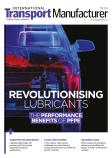How can innovative coatings help to prevent nuisances and dangers aboard marine vessels?
Shipbuilders, owners, and operators deal with numerous practical concerns when it comes to thermal and sound issues onboard their vessels. Seal For Life’s Mascoat line of marine thermal and sound reduction coatings products are formulated to meet the challenging, harsh marine environments and insulation requirements of the maritime industry. The company’s unique coatings help reduce or completely prevent condensation issues and avoid harmful noise and vibrations. With approvals from multiple certification bodies and products that have been tested to ensure that they survive and thrive in harsh marine environments, the coatings are designed to give customers peace of mind.
REDUCING CONDENSATION AND HEAT TRANSFER
Condensation can be a challenge because a vessel’s hull is always interacting with the water. Depending on the location the water may be a balmy 30°C in warm tropical areas or a chilly 2°C in the Arctic. Formulated to provide a thermal barrier and condensation control, Mascoat Marine-DTM is a water-based, low-VOC coating that applies like paint and cures quickly to enhance stringent construction schedules. Comprised of air-filled particles suspended in an acrylic binder, Marine-DTM is ideal for use in all types of workboats, platforms, barges, yachts, ferries, and leisure crafts.
The lightweight coating is currently in use on thousands of marine vessels from Alaska to Antarctica and is designed to solve persistent moisture and thermal transfer issues. The coatings can be used as a standalone solution or in conjunction with pin-and-blanket type insulations depending on the vessel’s operation parameters.
MINIMISING NOISE AND VIBRATION
Mascoat Sound Control-dB sound damping coating has been trusted since 1995 to provide effective, long-lasting vibration and noise reduction. Mascoat recently released the latest version, MSC-dB4, drastically improving sound damping characteristics, especially under 300 Hz, and capable of higher application film builds per coat to speed up application and help meet delivery schedules. Sounds under 300 Hz transmit extremely efficiently through the metal structure of a vessel, and can be especially dangerous to people working in crew spaces for extended periods of time.
The coating’s revolutionary technology minimises loud vibration due to structural translation and mechanical output—which significantly increases safety and ensures vessel comfort for crew and passengers. Typical total application thicknesses ranges from 40–160 mils (1–4 mm), depending on the application and customer requirements. When the coating is employed, customers can see decibel readings drop 10-15 dB, depending on substrate and thickness specifications. It is possible to use MSC-dB4 all over a vessel, including bow thruster compartments, overheads, engine rooms, crew/passenger quarters, and decks.











